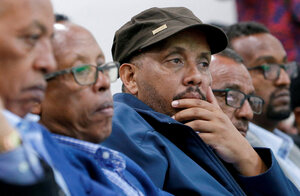From war to warmth in East Africa
Fragile transitions underway in Ethiopia and Sudan are laying the groundwork for a return to democracy based on truth and reconciliation.

Ethiopian leaders witness the signing of an agreement between the government and Tigrayan forces in Nairobi, Kenya, Nov. 12, 2022.
Reuters
Over the past half-century, nearly 50 countries have sought to heal the injustices of an internal conflict through the use of truth commissions. These official panels have no singular design, but they do share some common ingredients: full disclosure of harmful actions; restoration for victims; and a sliding scale of penalties for perpetrators based on their honesty, remorse, and the nature of their crimes. This mix of traditional justice and mercy, called transitional justice, is aimed at societal reconciliation.
Two countries in East Africa are now edging toward their own models of transitional justice. Each in its own way is showing that restoring trust between former foes is essential to reviving democracy. And that starts with humility.
In Sudan, which is Africa’s third-largest country, the military junta that seized power in a coup 17 months ago began talks this week with pro-democracy leaders to ensure the armed forces operate under civilian command. “During our history, the armed forces have supported dictatorial governments, and we want to put an end to that,” coup leader Gen. Abdel Fattah al-Burhan told troops last Sunday.
In neighboring Ethiopia, which is Africa’s second-most populous state, the government launched a nationwide listening tour this month to engage the public on how to unite a society emerging from a devastating two-year civil war. Last week it removed two rebel factions central to that conflict from its list of terrorist groups – a conciliatory move that one minister said was necessary “to end the politics of hatred and evil.”
These fragile first steps stir understandable skepticism. Since seizing power in October 2021, the Sudanese military has racked up scores of human rights abuses attempting to quell nonviolent protests – including mass arrests and the killing of more than 125 demonstrators. Pro-democracy groups remain split over whether to seek a negotiated transition. Those who oppose such a move fear that doing so legitimizes the junta.
The war in Ethiopia killed an estimated 600,000 people. The United Nations and human rights groups like Amnesty International have reported credible evidence of ethnic cleansing and the use of rape and mass starvation as tools of war. No faction to the fighting was found to be immune to such a tactics.
The peace agreement that ended the war in Ethiopia last November was the first to include a new African Union framework for transitional justice. In January, the government published recommendations aimed at seeding a national conversation and will convene roughly 60 public meetings on reconciliation and justice.
That has won the government some cautious goodwill from the international community. A team from the International Monetary Fund arrived in Ethiopia this week to prepare financial support for economic reforms, drought relief, and reconstruction. Visiting the country earlier this month, U.S. Secretary of State Antony Blinken said that lasting international support required that Ethiopians acknowledge “the atrocities committed by all parties ... and their commitments to each other” to achieve equitable justice.
That condition reflects a key lesson learned in other post-conflict societies – that reconciliation, as Rwanda President Paul Kagame has said, “was not going to come from outside.” After the 1994 genocide in his country, “We looked each other in the eyes and asked: How do we reconcile and start building? So we had to make a choice. This was the thinking. Forgiving is a process as well as a choice.”
However imperfectly, Ethiopia and Sudan may now be making a similar choice.

